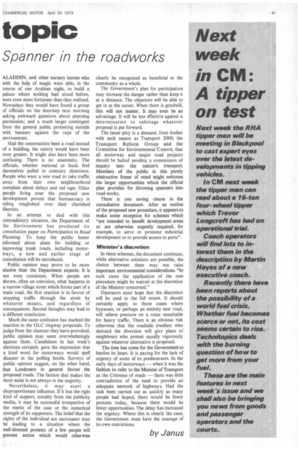topic
Page 43

If you've noticed an error in this article please click here to report it so we can fix it.
Spanner in the roadworks
ALADDIN, and other nursery heroes who with the help of magic were able, in the course of one Arabian night, to build a palace where nothing had stood before, were even more fortunate than they realized.
Nowadays they would have found a group cttofficials on the doorstep next morning
asking awkward questions about planning permission; and a much larger contingent from the general public protesting outside with banners against the rape of the environment.
Had the construction been a road instead of a building, the outcry would have been even greater. It might also have been more confusing. There is no unanimity. The officials, whether national or local, find themselves pulled in contrary directions.
People who want a new road to take traffic away from their own neighbourhood complain about delays and red tape. Other people living near the proposed new development protest that bureaucracy is riding roughshod over their cherished liberties.
In an attempt to deal with this contradictory situation, the Department of the Environment has produced its
consultation paper on Participation in Road Planning. To keep the public better
informed about plans for building or improving trunk roads, including motorways, a new and earlier stage of consultation will be introduced.
Public opinion may prove to be more elusive than the Department expects. It is not even consistent. When people are shown, often on television, what happens in a narrow village street which forms part of a main road, the first reaction is in favour of stopping traffic through the street by whatever means, and regardless of consequences. Second thoughts may lead to a different conclusion.
Much the same confusion has marked the reaction to the GLC ringway proposals. To judge from the clamour they have provoked, public opinion may seem overwhelmingly against them. Candidates in last week's elections certainly gave the impression that a kind word for motorways would spell disaster in the polling booth. Surveys of public opinion suggest, on the other hand, that Londoners in general favour the proposed roads. The faction that makes the most noise is not always in the majority.
Nevertheless, it may exert a disproportionate influence. If it has the right kind of support, notably from the publicity media, it may be successful irrespective of the merits of the case or the numerical strength of its supporters. The belief that the rights of the individual are sacrosanct may be leading to a situation where the well-directed protests of a few people will prevent action which would otherwise clearly be recognized as beneficial to the community as a whole.
The Government's plan for participation may increase the danger rather than keep it at a distance. The objectors will be able to get in at the outset. When there is goodwill, this will not matter. It may even be an advantage. It will be less effective against a determination to sabotage whatever proposal is put forward.
The latest ploy is a demand, from bodies with such names as Transport 2000, the Transport Reform Group and the Committee for Environmental Control, that all motorway and major road projects should be halted pending a commission of inquiry into the nation's transport. Members of the public in this purely obstructive frame of mind might welcome the larger opportunities which the official plan provides for throwing spanners into road-works.
There is one saving clause in the consultative document. After an outline of the proposed new procedure, it appears to make some exception for schemes which "are intended to benefit development areas or are otherwise urgently required, for example, to serve or promote industrial development or to provide access to ports".
Minister's discretion In these schemes, the document continues, while alternative solutions are possible, the choice between them may not raise important environmental considerations. "In such cases the application of the new procedure might be waived at the discretion of the Minister concerned."
Operators must hope that the discretion will be used to the full extent. It should certainly apply to those cases where bypasses, or perhaps an entirely new road, will relieve pressure on a route unsuitable for heavy traffic. There is an obvious risk otherwise that the roadside dwellers who demand the diversion will give place to' neighbours who protest equally vigorously against whatever alternative is proposed.
The time has come for the Government to harden its heart. It is paying for the lack of urgency of some of its predecessors. In the early days of motorways — when it was the fashion to refer to the Minister of Transport as the Colossus of roads — there was little contradiction of the need to provide an adequate network of highways. Had the task been carried out as quickly as many people had hoped, there would be fewer protests today, because there would be fewer opportunities. The delay has increased the urgency. Where this is clearly the case, the Government must have the courage of its own convictions.
by Janus




































































































